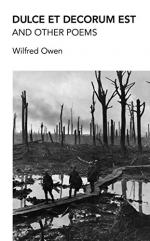|
This section contains 304 words (approx. 1 page at 400 words per page) |

|
Dulce Et Decorum Est (Owen) Summary & Study Guide Description
Dulce Et Decorum Est (Owen) Summary & Study Guide includes comprehensive information and analysis to help you understand the book. This study guide contains the following sections:
This detailed literature summary also contains Quotes and a Free Quiz on Dulce Et Decorum Est (Owen) by Wilfred Owen.
The version of this poem used to create this study guide appears in: Owen, Wilfred. “Dulce et Decorum Est.” https://www.poetryfoundation.org/poems/46560/dulce-et-decorum-est.
Note that parenthetical citations within the guide refer to the lines of the poem from which the quotations are taken.
“Dulce et Decorum Est” is a 28-line modified iambic pentameter war poem written by English solider-poet Wilfred Owen. Based on a poison gas attack endured by Owen and his battalion while fighting in France in early 1917, the poem was first composed in late 1917 while the poet was recovering from shell shock before heading back to the front. Owen was one of several poets who participated in the so-called “Great War” and reacted to it in verse. As the first truly modern war, World War I saw the debut of multiple technologies of destruction, including machine guns, submarines, and, most relevant for “Dulce et Decorum Est,” the use of poison gas. Accordingly, the poetry it inspired took a new approach to what had been considered the glories of war and dying for one’s country. Given the continued use of those technologies in modern military maneuvers, “Dulce et Decorum Est” remains a poignant and potent warning about the dehumanizing effects of war.
The poem opens on a scene of worn-down soldiers marching away from the battlefield to rest for the night, almost delirious with fatigue. A gas attack brings them back to reality, especially as one of their company fails to get his mask on in time and suffers the horrible effects of the gas. The speaker reveals that he sees this comrade dying again in his dreams every night. He then addresses those who would romanticize war and its participants, declaring that if they too could experience his nightmare, they would glorify war no longer.
Read more from the Study Guide
|
This section contains 304 words (approx. 1 page at 400 words per page) |

|



